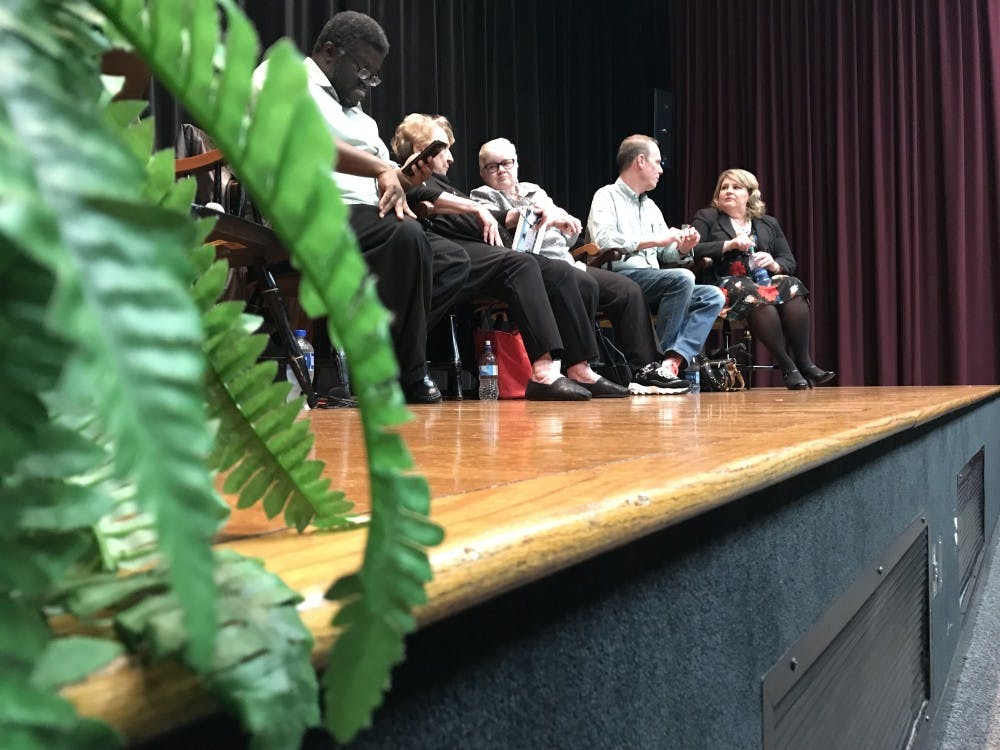In celebration of the launch of her book, "Southern Perspectives on the Queer Movement: Committed to Home," editor and activist Sheila Morris took the stage in the Russell House Theater on Monday afternoon for a panel discussion on LGBTQ activism in the south.
The leadership lecture and panel, "Queer Activism in the Palmetto State," was one of the first of several events during USC's Provost Leadership Week. The Carolina International House at Maxcy College sponsored the event along with USC's Women's and Gender Studies department and the Institute for Southern Studies.
"The book we are here to celebrate tonight and to learn from is an inspiring piece of work," said Dr. David Snyder, faculty principal of the International House. "It features profiles, generally first-person oral histories of more than 20 prominent activists and leaders in the South Carolina LGBTQ movement."
Joining Morris on the panel were five other leaders in the LGBTQ movement whose personal stories were included in Morris' book, including Harriet Hancock, attorney and co-founder of the South Carolina Pride Movement.
Snyder opened the floor to the panelists to talk about the book's subtitle, "Committed to Home," and what it means to them and how it connects to their activism.
"When I think about the title, 'Committed to Home,' I think about so many people, good people — gays, lesbians, bisexuals, transgenders — who have left South Carolina because it's been too hard here for them," Hancock said. "So I think the people, when they talk about 'committed to home,' you have to stay where you are to create change. If everybody left South Carolina, we wouldn't have any change here today."
Pat Patterson, a professor at Midlands Technical College, agreed with Hancock.
Patterson spoke about the difference between a "family of birth" and a "family of choice," pointing out that the other leaders on stage as well as some people in the audience were his family of choice ever since he moved to Columbia from Spartanburg. He also noted that his best friend in college moved to California because it was "easier" than living in South Carolina.
"When we stay here, we can effect change here," Patterson said. "To borrow the the words of our former governor, 'it can be a great day in South Carolina' when people like this ... band together and stand up for what's right."
Ed Madden, English professor and director of USC's Women's and Gender Studies department, also sat on the panel.
Madden formerly served as a faculty advisor for the student organization that is now Individuals Respecting Identities and Sexualities (IRIS). He recalled that the organization used to meet in the old business school for fear of being seen in a more common place such as Russell House, and noted change within the university over the years in regard to the visibility and self-awareness of LGBTQ students and allies.
"My last year as advisor ... it was over half freshmen, which means they either came out when they got here or they were already self-aware enough to be out before they ever landed on campus," Madden said, "and it was very politically active and visible."
"In my time here, to me, that's such a marker — the way that the student organization has changed toward political engagement and visibility, and skewing toward a much younger demographic than they were when I came," Madden said.
While there were very few undergraduate students in attendance for the discussion, third-year business student Brittany Strampp was in the audience and says she enjoys when events such as the leadership lecture hit campus.
"I mean having that representation — hearing voices is just so important," Strampp said. "I feel like we don't hear about, like, older LGBT leaders." She appreciated being able to learn about past moments in the LGBTQ movement from another generation.
In the past decade alone, same-sex marriage was legalized nationwide, and closer to home two bills in the State House similar to North Carolina's "HB2" bill were shot down in light of the grassroots activism of people on the stage and other members of the community.
Veronica Leggett, a second-year business economics student, identified with the southern component of the panelists' stories and noticed that knowledge of what is going on is likely less widespread in places like South Carolina.
"You don't hear about what has happened," Leggett said, "so then when you try to make new [changes], you don't really know how to do that. That's one thing that I thought was really interesting ... learning what they did and how they did it."

